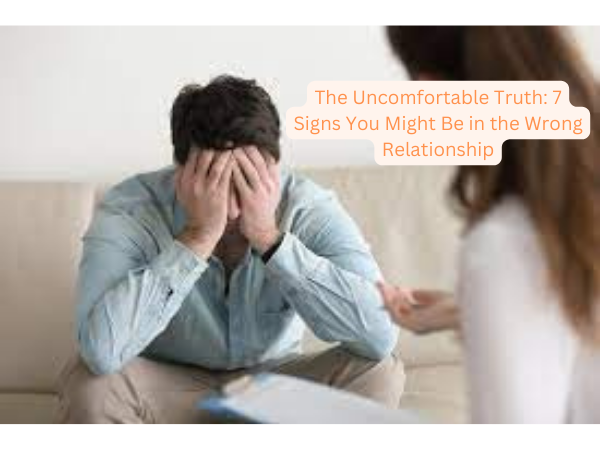Love is a beautiful thing, but sometimes, even the strongest feelings can fade. Imagine pouring your heart and soul into a relationship, only to realize it’s not bringing you the happiness you deserve. If you’ve ever questioned the compatibility of your relationship, here are 7 signs that might indicate you’re with the wrong person:
Constant Conflict Feels Like the Norm
Healthy disagreements are a natural part of any relationship. But what if arguments become the soundtrack of your love life? Instead of constructive conversations, do your discussions devolve into personal attacks and hurtful words? Imagine feeling like you’re constantly walking on eggshells, afraid to express yourself for fear of sparking another fight. This kind of constant conflict can be emotionally draining and is a major red flag.
Your Happiness Takes a Backseat
Think about it: a fulfilling relationship should make you feel good, not drag you down. Do you find yourself constantly sacrificing your own happiness or well-being to appease your partner? Are your needs and desires consistently disregarded or dismissed? In a healthy relationship, both partners should feel supported and encouraged to pursue their dreams and passions. If your partner consistently puts their happiness above yours, it might be a sign of deeper incompatibility.
You Feel Emotionally Isolated
A partner should be your confidant, your cheerleader, and your shoulder to cry on. Do you feel increasingly isolated from your partner emotionally? Are you hesitant to share your true feelings or vulnerabilities for fear of judgment or lack of understanding? A healthy relationship thrives on open communication and emotional intimacy. If you feel like you can’t truly be yourself around your partner, it’s a cause for concern.
Your Values Clash Like Cymbals
Imagine two puzzle pieces that just don’t fit. Similarly, core values are the fundamental beliefs that guide our lives. Do your core values and long-term goals fundamentally clash with your partner’s? For instance, if you dream of a life filled with travel and adventure, while your partner prioritizes stability and settling down, this incompatibility can lead to major friction down the road. While compromise is important, core values shouldn’t be a constant negotiation.
You Feel Pressured to Change Who You Are
A healthy relationship allows you to blossom and grow while embracing who you truly are. Does your partner constantly criticize your personality, hobbies, or even your appearance? Do you feel pressured to change yourself to fit some ideal version they have in mind? A good partner loves you for who you are, flaws and all. If you feel like you have to constantly morph into someone else to gain your partner’s approval, it’s a recipe for unhappiness.
Trust Issues Cast a Long Shadow
Trust is the bedrock of any strong relationship. Do you find yourself constantly questioning your partner’s loyalty or actions? Have there been instances of infidelity or deception that have shattered your trust? Rebuilding trust is a difficult process, and a relationship riddled with suspicion can be incredibly stressful. If you can’t seem to move past trust issues, it might be time to consider if the relationship has a healthy future.
Your Gut Tells You Something Isn’t Right
We all have an inner voice, that intuition that sometimes whispers warnings we might choose to ignore. Do you have a nagging feeling that something is off in your relationship? Don’t dismiss your gut instinct. Sometimes, a persistent feeling of unease can be a sign that the relationship isn’t right for you.
Walking Away Doesn’t Mean Giving Up on Love
Leaving a relationship, especially a long-term one, is a difficult decision. But remember, choosing yourself isn’t selfish. In fact, it’s the first step towards finding a love that truly fulfils you. If these signs resonate with you, don’t be afraid to seek support from friends, family, or even a therapist. Remember, you deserve a relationship built on respect, trust, and mutual happiness.
Frequently Asked Questions (FAQs)
1. Is it always bad to argue with my partner?
Healthy disagreements are a normal part of any relationship. However, the key is how you argue. Focus on constructive communication and avoid personal attacks or hurtful language. Aim for solutions, not simply pointing fingers. If your arguments feel constant and leave you feeling worse instead of closer, that’s a red flag.
2. How can I tell if my unhappiness is temporary or a sign of a bigger problem?
Life throws curveballs sometimes, and external factors like stress or work can affect your mood and impact your relationship. Give yourself space to navigate those challenges. However, if the unhappiness persists for a long time and these signs become constant themes in your relationship, it might be time to have a deeper conversation with your partner or seek professional guidance from a therapist.
3. Can couples grow out of incompatibility?
People can change and grow over time, but fundamental values and core personalities tend to remain fairly consistent. If you identify a major value clash, like wanting children versus being child-free, open communication is crucial. Are you both willing to compromise or adapt your long-term goals? If not, it’s important to be honest about that incompatibility.
4. Is it okay to ask my partner to change certain behaviors?
Absolutely! Open communication is key in any relationship. If there are specific behaviors that bother you, like a lack of communication or bad habits, it’s okay to address them with your partner. However, the focus should be on growth, not trying to mold them into someone entirely different. Be open to their perspective as well, and see if there’s a way to meet each other halfway.
5. How do I know if it’s time to leave the relationship?
This is a difficult question, and the answer will vary depending on your specific situation. If you’ve tried communicating your concerns and haven’t seen any positive changes, or if the relationship is causing you significant emotional distress, it might be time to consider moving on. Remember, prioritizing your own well-being isn’t selfish, and it’s the first step towards finding a love that truly fulfils you.

